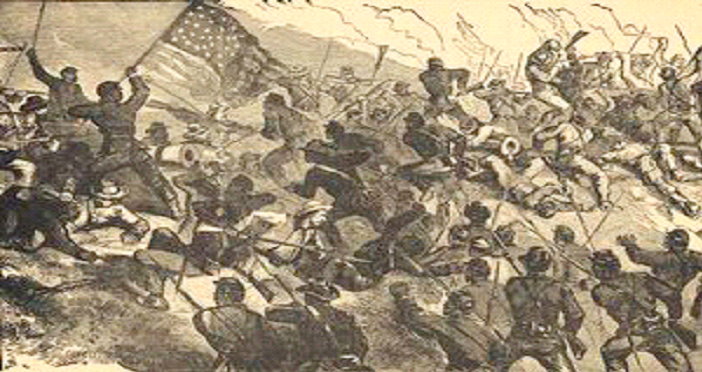The Gospel Army
|
|

Courtesy of www.RebelStore.com
However by the summer of 1862 Northerners were growing tired of being defeated by the South and fighting in the Civil War. The Union was running short of men. While stationed in New Orleans and short of men, Brigadier General Benjamin Butler turned to the free Black residents of New Orleans to help fight the war. New Orleans had a population of 150,000, of which 18,000 were slaves and 10,000 were free Blacks (James Parton, General Butler In New Orleans, P130). They were members of a Confederate regiment called “1st Louisiana Native Guard.” Free Blacks were enrolled by Andrew Jackson in the War of 1812 and again enrolled by Governer Moore in 1861(James Parton, General Butler In New Orleans, P134). They were the first Black regiment to be formed and they have the distinction of being the only Black regiment to be commanded by Black officers. Some were slave owners and some were mulattos. Would they switch sides and fight for the freedom of all Blacks? Butler had the following conversation with a group of them:
"But,"
I said, "I want you to answer me one question. My officiers, most of
them, believe that negroes won't fight."
"Oh,
but we will, "came from the whole of them.
"You
seem to be an intelligent man, "said I, to their spokesman;
"Answer me this question: I have found out that you know just as well
what this war is about as I do, and if the United States succeed in it,
it will put an end to slavery." They all looked assent.
"Then
tell me why some negroes have not in this war struck a good blow
somewhere for their freedom? "General, will you permit a question?"
"Yes."
"If we
colored men had risen to make war on our masters, would not it have been
our duty to ourselves, they being our enemies, to kill the enemy
wherever we could find them? and all the white men would have been our
enemies to be killed?"
"I
don't know but what you are right," said I. "I think that would be a
logical necessity of insurrection."
"If the
colored men had begun such a war as that, General, which general of the
United States army should we have called on to help us fight our
battles?" That was unanswerable.
"Well,"
I said, "why do you think that your men will fight?"
"General we come from a fighting race. Our fathers were brought here
slaves because they were captured in war, and in hand to hand fights,
too. We are willing to fight. Pardon me, General, but the only cowardly
blood we have got in our veins is the white blood."
General Benjamin Butler, Butlers Book

On May 27, 1863 the first large battle that included a Black regiment occurred at Port Hudson Louisiana. Butler had mustered them into Union service making them the first Black regiment to service the Union and the only Black regiment to have all Black officers. Butler’s First Regiment of Louisiana Native Guard lived up to their promise to Butler that they would fight with courage and honor. They attacked a heavily defended Confederate fort over five times until their force of 900 men was cut down to less than 300. The following article appeared in the New York Tribute.
" From " The New-York Tribune," June 8, 1863: -"Nobly done, First Regiment of Louisiana Native Guard! Though you failed to carry the rebel works against overwhelming numbers, you did not charge and fight and fall in vain. That heap of six hundred corpses, lying there dark and grim and silent before and within the rebel works, is a better proclamation of freedom than even President Lincoln's. A race ready to die thus was never yet retained in bondage, and never can be. Even the Wood copperheads, who will not fight themselves, and try to keep others out of the Union ranks, will not dare to mob negro regiments if this is their style of fighting. “
W. W. Brown, The Negro in the American Rebellion, p175
Copyright © 2006 The Gospel Army Black History Group. All rights reserved.
Revised: 01/24/07.